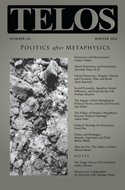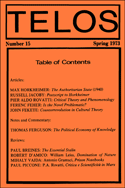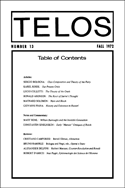By Panajotis Kondylis · Monday, November 23, 2015 The following article was originally published in the Greek newspaper To Vima on December 21, 1997, on the occasion of the 70th anniversary of the first publication of Martin Heidegger’s Being and Time.
I consider Being and Time to be one of the overrated books of the century. To be precise, I regard it as a collection of platitudes expressed in pretentious and obscure language. Whoever goes beyond the narrow philosophical perspective and surveys the history of ideas and problems in its totality arrives at this conclusion. Being very one-sidedly educated as a rule, philosophers usually inflate the importance of things that take place in their own field and consider an author original solely because he introduces them to one or two new concepts. In reality, the philosophy of the Modern Era did not create its own problematic but followed, directly or indirectly, in a better or worse manner, the rapid changes that occurred chiefly in the natural sciences to begin with, and subsequently in the social and human sciences. The epistemologically oriented philosophy of the subject was developed in the seventeenth and eighteenth centuries as an attempt to provide answers to questions raised by the mathematical physics of the time (the distinction between primary and secondary qualities, causality, substance). The social and human sciences, whose foundations were laid in the eighteenth century and which came into their own in the nineteenth, introduced a perspective that has proven fatal for philosophy’s vital myth, namely, that of the autonomy of spirit, since they demonstrated its dependence not only on “irrational” and “existential” factors but on “non-spiritual,” socioeconomic, and historical ones too.
Continue reading →
By Mohammad Rafi · Friday, April 19, 2013 The following paper was presented at the Seventh Annual Telos Conference, held on February 15–17, 2013, in New York City.
 German philosopher Martin Heidegger’s magnum opus, Being and Time (1927), constitutes one of the most important contributions to philosophy of the last century. Beyond having a defining influence on numerous fields of study within philosophy that include but are not limited to existentialism, post-structuralism, and deconstruction, Heidegger has often been viewed as “the most creative religious writer of the twentieth century” (Ireton, 243). It should thus not be surprising that his ideas were widely received and regarded by Iranian intellectuals and students before (and after) the Iranian Revolution of 1979. One of the main seeds of Heideggerian thought that blossomed particularly well in the Iranian context was his notion of authenticity (Eigentlichkeit). Used by Heidegger to draw ontological distinctions, authenticity inspired a politicized discourse—among its Iranian readers—on a return to an “authentic” self. The authenticity of the Iranian return to the self firmly grounded on a separation from imposed Western ideals. A tendency among Iranians toward the study of existentialism[1] in addition to Heidegger’s poignant critique of a decadent West cloaked in religious terminology made him an excellent partner to a group of Iranian intellectuals unsatisfied with a despotic monarch perceived to be antagonistic to Islam. German philosopher Martin Heidegger’s magnum opus, Being and Time (1927), constitutes one of the most important contributions to philosophy of the last century. Beyond having a defining influence on numerous fields of study within philosophy that include but are not limited to existentialism, post-structuralism, and deconstruction, Heidegger has often been viewed as “the most creative religious writer of the twentieth century” (Ireton, 243). It should thus not be surprising that his ideas were widely received and regarded by Iranian intellectuals and students before (and after) the Iranian Revolution of 1979. One of the main seeds of Heideggerian thought that blossomed particularly well in the Iranian context was his notion of authenticity (Eigentlichkeit). Used by Heidegger to draw ontological distinctions, authenticity inspired a politicized discourse—among its Iranian readers—on a return to an “authentic” self. The authenticity of the Iranian return to the self firmly grounded on a separation from imposed Western ideals. A tendency among Iranians toward the study of existentialism[1] in addition to Heidegger’s poignant critique of a decadent West cloaked in religious terminology made him an excellent partner to a group of Iranian intellectuals unsatisfied with a despotic monarch perceived to be antagonistic to Islam.
Continue reading →
By Michael Marder · Wednesday, February 13, 2013 Michael Marder’s “After the Fire: The Politics of Ashes” appears in Telos 161 (Winter 2012). Read the full version online at the Telos Online website, or purchase a print copy of the issue in our store.
 Two fires are kindled at the threshold of the metaphysical era, and both are extinguished, almost simultaneously, as soon as metaphysics exhausts itself (or else gets exhausted, tired, fatigued with itself) in its final Nietzschean inversion. The political reality of the twenty-first century is, as a whole, a comet tail of these ancient blazes that, until recently, seemed to be older than time itself, gave the impression of being eternal, undying, inextinguishable. How to find one’s bearings among the cinders and ashes of what the flames consumed? How to make sense—if make sense we must—of the burnt and smoldering remains, the traces of catastrophes, as much as of hopes and revolutionary desires, littering the horizons of the political today? Two fires are kindled at the threshold of the metaphysical era, and both are extinguished, almost simultaneously, as soon as metaphysics exhausts itself (or else gets exhausted, tired, fatigued with itself) in its final Nietzschean inversion. The political reality of the twenty-first century is, as a whole, a comet tail of these ancient blazes that, until recently, seemed to be older than time itself, gave the impression of being eternal, undying, inextinguishable. How to find one’s bearings among the cinders and ashes of what the flames consumed? How to make sense—if make sense we must—of the burnt and smoldering remains, the traces of catastrophes, as much as of hopes and revolutionary desires, littering the horizons of the political today?
Continue reading →
By Damien Booth · Tuesday, January 8, 2013 As an occasional feature on TELOSscope, we highlight a past Telos article whose critical insights continue to illuminate our thinking and challenge our assumptions. Today, Damien Booth looks at Pier Aldo Rovatti’s “Critical Theory and Phenomenology,” from Telos 15 (Spring 1973).
 The relationship between phenomenology and critical theory is a complex one that deserves a great deal of attention. On the one hand, Marcuse, as a student of Heidegger, maintained a certain level of affiliation with his thought, while, on the other, Lukács and Adorno were critical of phenomenology, with Heidegger in particular coming under criticism. In “Critical Theory and Phenomenology,” Pier Aldo Rovatti attempts to show how these two modes of thought may have a meaningful encounter. The relationship between phenomenology and critical theory is a complex one that deserves a great deal of attention. On the one hand, Marcuse, as a student of Heidegger, maintained a certain level of affiliation with his thought, while, on the other, Lukács and Adorno were critical of phenomenology, with Heidegger in particular coming under criticism. In “Critical Theory and Phenomenology,” Pier Aldo Rovatti attempts to show how these two modes of thought may have a meaningful encounter.
Continue reading →
By Damien Booth · Tuesday, October 16, 2012 As an occasional feature on TELOSscope, we highlight a past Telos article whose critical insights continue to illuminate our thinking and challenge our assumptions. Today, Damien Booth looks at Ronald Aronson’s “Interpreting Husserl and Heidegger: The Root of Sartre’s Thought” from Telos 13 (Fall 1972).
 Readers familiar with Jean-Paul Sartre’s philosophical writings understand that he inherited a great deal of his conceptual language from the phenomenological projects of Edmund Husserl and Martin Heidegger. In “Interpreting Husserl and Heidegger: The Root of Sartre’s Thought,” Ronald Aronson strips away much of the mystery from Sartre’s concepts and, in so doing, reveals something about the framework that Sartre inherits that may well restrict his philosophical project from the very start. The accusation Aronson levies against Sartre is that he opens up a gap between consciousness and the world, a gap that Husserl wished to close by developing his transcendental phenomenological method. Essentially, Aronson thinks that Sartre abandons the very developments that made Husserl’s and Heidegger’s projects tenable in the first place: “we find [Sartre] erasing all the structures of consciousness (emotional, cognitive, and social) which make the world intelligible and making consciousness into a ‘nothing'” (47). As a result, Sartre becomes tangled up in his “own conceptual apparatus.” To find out why he gets so conceptually confused by these entanglements, Aronson traces Sartre’s key concepts back to their roots in Husserl’s cognitive projects and Heidegger’s hermeneutic phenomenology. Readers familiar with Jean-Paul Sartre’s philosophical writings understand that he inherited a great deal of his conceptual language from the phenomenological projects of Edmund Husserl and Martin Heidegger. In “Interpreting Husserl and Heidegger: The Root of Sartre’s Thought,” Ronald Aronson strips away much of the mystery from Sartre’s concepts and, in so doing, reveals something about the framework that Sartre inherits that may well restrict his philosophical project from the very start. The accusation Aronson levies against Sartre is that he opens up a gap between consciousness and the world, a gap that Husserl wished to close by developing his transcendental phenomenological method. Essentially, Aronson thinks that Sartre abandons the very developments that made Husserl’s and Heidegger’s projects tenable in the first place: “we find [Sartre] erasing all the structures of consciousness (emotional, cognitive, and social) which make the world intelligible and making consciousness into a ‘nothing'” (47). As a result, Sartre becomes tangled up in his “own conceptual apparatus.” To find out why he gets so conceptually confused by these entanglements, Aronson traces Sartre’s key concepts back to their roots in Husserl’s cognitive projects and Heidegger’s hermeneutic phenomenology.
Continue reading →
|
|
 German philosopher Martin Heidegger’s magnum opus, Being and Time (1927), constitutes one of the most important contributions to philosophy of the last century. Beyond having a defining influence on numerous fields of study within philosophy that include but are not limited to existentialism, post-structuralism, and deconstruction, Heidegger has often been viewed as “the most creative religious writer of the twentieth century” (Ireton, 243). It should thus not be surprising that his ideas were widely received and regarded by Iranian intellectuals and students before (and after) the Iranian Revolution of 1979. One of the main seeds of Heideggerian thought that blossomed particularly well in the Iranian context was his notion of authenticity (Eigentlichkeit). Used by Heidegger to draw ontological distinctions, authenticity inspired a politicized discourse—among its Iranian readers—on a return to an “authentic” self. The authenticity of the Iranian return to the self firmly grounded on a separation from imposed Western ideals. A tendency among Iranians toward the study of existentialism[1] in addition to Heidegger’s poignant critique of a decadent West cloaked in religious terminology made him an excellent partner to a group of Iranian intellectuals unsatisfied with a despotic monarch perceived to be antagonistic to Islam.
German philosopher Martin Heidegger’s magnum opus, Being and Time (1927), constitutes one of the most important contributions to philosophy of the last century. Beyond having a defining influence on numerous fields of study within philosophy that include but are not limited to existentialism, post-structuralism, and deconstruction, Heidegger has often been viewed as “the most creative religious writer of the twentieth century” (Ireton, 243). It should thus not be surprising that his ideas were widely received and regarded by Iranian intellectuals and students before (and after) the Iranian Revolution of 1979. One of the main seeds of Heideggerian thought that blossomed particularly well in the Iranian context was his notion of authenticity (Eigentlichkeit). Used by Heidegger to draw ontological distinctions, authenticity inspired a politicized discourse—among its Iranian readers—on a return to an “authentic” self. The authenticity of the Iranian return to the self firmly grounded on a separation from imposed Western ideals. A tendency among Iranians toward the study of existentialism[1] in addition to Heidegger’s poignant critique of a decadent West cloaked in religious terminology made him an excellent partner to a group of Iranian intellectuals unsatisfied with a despotic monarch perceived to be antagonistic to Islam.  Two fires are kindled at the threshold of the metaphysical era, and both are extinguished, almost simultaneously, as soon as metaphysics exhausts itself (or else gets exhausted, tired, fatigued with itself) in its final Nietzschean inversion. The political reality of the twenty-first century is, as a whole, a comet tail of these ancient blazes that, until recently, seemed to be older than time itself, gave the impression of being eternal, undying, inextinguishable. How to find one’s bearings among the cinders and ashes of what the flames consumed? How to make sense—if make sense we must—of the burnt and smoldering remains, the traces of catastrophes, as much as of hopes and revolutionary desires, littering the horizons of the political today?
Two fires are kindled at the threshold of the metaphysical era, and both are extinguished, almost simultaneously, as soon as metaphysics exhausts itself (or else gets exhausted, tired, fatigued with itself) in its final Nietzschean inversion. The political reality of the twenty-first century is, as a whole, a comet tail of these ancient blazes that, until recently, seemed to be older than time itself, gave the impression of being eternal, undying, inextinguishable. How to find one’s bearings among the cinders and ashes of what the flames consumed? How to make sense—if make sense we must—of the burnt and smoldering remains, the traces of catastrophes, as much as of hopes and revolutionary desires, littering the horizons of the political today?  The relationship between phenomenology and critical theory is a complex one that deserves a great deal of attention. On the one hand, Marcuse, as a student of Heidegger, maintained a certain level of affiliation with his thought, while, on the other, Lukács and Adorno were critical of phenomenology, with Heidegger in particular coming under criticism. In “Critical Theory and Phenomenology,” Pier Aldo Rovatti attempts to show how these two modes of thought may have a meaningful encounter.
The relationship between phenomenology and critical theory is a complex one that deserves a great deal of attention. On the one hand, Marcuse, as a student of Heidegger, maintained a certain level of affiliation with his thought, while, on the other, Lukács and Adorno were critical of phenomenology, with Heidegger in particular coming under criticism. In “Critical Theory and Phenomenology,” Pier Aldo Rovatti attempts to show how these two modes of thought may have a meaningful encounter.  Readers familiar with Jean-Paul Sartre’s philosophical writings understand that he inherited a great deal of his conceptual language from the phenomenological projects of Edmund Husserl and Martin Heidegger. In “Interpreting Husserl and Heidegger: The Root of Sartre’s Thought,” Ronald Aronson strips away much of the mystery from Sartre’s concepts and, in so doing, reveals something about the framework that Sartre inherits that may well restrict his philosophical project from the very start. The accusation Aronson levies against Sartre is that he opens up a gap between consciousness and the world, a gap that Husserl wished to close by developing his transcendental phenomenological method. Essentially, Aronson thinks that Sartre abandons the very developments that made Husserl’s and Heidegger’s projects tenable in the first place: “we find [Sartre] erasing all the structures of consciousness (emotional, cognitive, and social) which make the world intelligible and making consciousness into a ‘nothing'” (47). As a result, Sartre becomes tangled up in his “own conceptual apparatus.” To find out why he gets so conceptually confused by these entanglements, Aronson traces Sartre’s key concepts back to their roots in Husserl’s cognitive projects and Heidegger’s hermeneutic phenomenology.
Readers familiar with Jean-Paul Sartre’s philosophical writings understand that he inherited a great deal of his conceptual language from the phenomenological projects of Edmund Husserl and Martin Heidegger. In “Interpreting Husserl and Heidegger: The Root of Sartre’s Thought,” Ronald Aronson strips away much of the mystery from Sartre’s concepts and, in so doing, reveals something about the framework that Sartre inherits that may well restrict his philosophical project from the very start. The accusation Aronson levies against Sartre is that he opens up a gap between consciousness and the world, a gap that Husserl wished to close by developing his transcendental phenomenological method. Essentially, Aronson thinks that Sartre abandons the very developments that made Husserl’s and Heidegger’s projects tenable in the first place: “we find [Sartre] erasing all the structures of consciousness (emotional, cognitive, and social) which make the world intelligible and making consciousness into a ‘nothing'” (47). As a result, Sartre becomes tangled up in his “own conceptual apparatus.” To find out why he gets so conceptually confused by these entanglements, Aronson traces Sartre’s key concepts back to their roots in Husserl’s cognitive projects and Heidegger’s hermeneutic phenomenology. 

